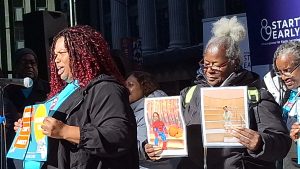Parents, proponents push for more Early Intervention funding
By Kevin Beese Staff Writer — November 25, 2024
Karen Berman (with arm raised), senior director of Start Early, an early learning nonprofit, and other Early Intervention proponents call for $60 million more to be added to the next state budget for EI services during a rally Nov. 1 at the Dirksen Federal Plaza in Chicago. (Photo by Kevin Beese/Chronicle Media)
(First of three parts looking at the push being made for more Early Intervention funding in the state’s next budget)
Talibah Moore waited six months for a decision on whether her son, Corey, would receive Early Intervention services for a developmental delay.
“They told me in March that he would receive services, but then they also told me he was only going to receive one month of service because he was turning 3 in April,” Moore said. “I refused. You are not going to change my life, turn my life upside down. He needs occupational therapy, speech, everything.
“Everything you can name my baby needed and he needed these services really, really badly.”
The Chicago resident continued to advocate, going to meetings and sharing her story and now her son is in the Chicago Public Schools system with an Individual Education Plan.
“I think it was a guardian angel that called me and said, ‘Come in. We’re going to evaluate him this summer,’” Moore said.
At a rally Nov. 1 in Downtown Chicago seeking more state Early Intervention funding, Moore said that while her son is getting services now, she believes he would be progressing farther and faster if he had gotten the Early Intervention services to which he was entitled.
“Had he received services, I really feel like my baby wouldn’t have gone through a whole lot of what he’s going through … My baby’s not the only one,” said the resident of the city’s Washington Heights neighborhood.
There are 3,000 children on state waiting lists, not receiving the Early Intervention services they are entitled to by law.
Early Intervention supporters are pushing for $60 million in additional EI funding in next year’s state budget to whittle down those waitlists and keep individuals working in EI positions.
Ana Arguita of Elgin has seen the benefits of Early Intervention with three of her four children needing EI services.

Talibah Moore (left) talks about her son Corey’s developmental delays while a parent supporter holds up photos of Corey during the Chicago rally. (Photo by Kevin Beese/Chronicle Media)
“It helped so much for them to be ready for preschool and beyond,” Arguita said at an Oct. 29 EI information session in Aurora. “During Early Intervention, the therapists were actually coming into my home and my children would play with them and I could see my children were learning. It was incredible.”
She noted that a friend of hers came from Guatemala with other families and they did not get needed EI services.
“I could see how their kids weren’t ready for school,” Arguita said. “They weren’t ready to socialize and share and do all these other things like my children were.”
The Elgin resident said she saw a difference when her first child needing EI services had a Spanish-speaking therapist and her other two children had an English-speaking therapist who needed a translator to communicate with them.
“These therapy sessions are only 45 minutes long,” Arguita said. “So, when we had to translate, it would cut the amount of time my children were being helped.”
Stefany Valencia of Aurora said she saw a developmental delay in her son’s speech when he was 2½ years old and got Early Intervention services for him.
“I could see the difference immediately,” Valencia said. “I saw him being supported by this therapist who would come to my house and do these exercises with him.”
Her son, now 7, is able to socialize and be around other children, she said.
Ymani Blake, a parent of a child with Early Intervention needs, says EI has a lot of systemic failures.

Ymani Blake, a parent of a child with developmental delays, talks at an EI information session Oct. 29 at the Veterans Park District in Melrose Park. (Photo by Kevin Beese/Chronicle Media)
“From the time that Indigo was born until she was 1, there were signs that she needed Early Intervention, but because of systemic racism we were not given an opportunity to get on the waitlist in the appropriate amount of time so that we could be seen and given a plan,” the Chicago resident said at an EI information session Oct. 29 in Melrose Park.
Left floating without services, Indigo aged out of the Early Intervention.
Blake said right now she is playing “occupational therapist, daycare teacher/worker and I cannot effectively serve my community as a doula because I am forced to stay at home and make sure that my daughter is safe and has the resources that she needs.”
kbeese@chronicleillinois.com







